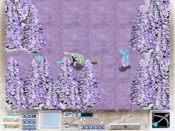Reply to Re: Wait times
If you don't have an account, just leave the password field blank.
> YOD speed is faster than DinkHD for me
Interesting, as I would have assumed the opposite. The scale brain calculates how many pixels to grow or shrink by per frame using an algorithm one may see here, in which "num" is the amount of pixels changed, calculated by dividing base_timing by 4 and then multiplying by 5.
Traditionally, base_timing is calculated by averaging the frame rate, and one may see its value in yedink by going to the "Variables" window and clicking on timers under the engine tab. At 60 frames per second, it should be hovering at around 5 or 6. Base_timing is the value I refer to above in regards to Seth locking the speed in the RTDink source, in which it's stuck at 7 without any FPS calculation applied.
Therefore, in Yedink (and 1.08 etc) it should be changing the sprite's size by 6 or 7 pixels per frame, whereas in RTDink i'd assume it'd be 9. The scale brain is also the only brain that interacts with the timing system in this way.
Interesting, as I would have assumed the opposite. The scale brain calculates how many pixels to grow or shrink by per frame using an algorithm one may see here, in which "num" is the amount of pixels changed, calculated by dividing base_timing by 4 and then multiplying by 5.
Traditionally, base_timing is calculated by averaging the frame rate, and one may see its value in yedink by going to the "Variables" window and clicking on timers under the engine tab. At 60 frames per second, it should be hovering at around 5 or 6. Base_timing is the value I refer to above in regards to Seth locking the speed in the RTDink source, in which it's stuck at 7 without any FPS calculation applied.
Therefore, in Yedink (and 1.08 etc) it should be changing the sprite's size by 6 or 7 pixels per frame, whereas in RTDink i'd assume it'd be 9. The scale brain is also the only brain that interacts with the timing system in this way.









